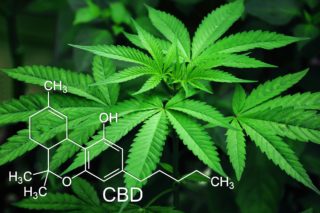There may be many causes of pain. Internal or external injury, internal inflammation, infection, or degeneration of bones or muscles due to wear and tear. Although pain is usually only a symptom, it can be quite unbearable for some and on certain occasions. CBD oil is proving itself to be a safe and effective alternative for pain management. No matter your point of view, if you are in pain, you have to consider this plant oil’s real benefits.
According to the Institute of Medicine of The National Academies, “over 100 million Americans live with chronic pain”. As a result, people often end becoming dependent on opioids in an attempt to manage their pain. For them, it is a choice between suffering the pain or becoming addict.
A Pain Management Crisis
This has caused a major crisis in the US, with an increasing number of people either living a less than functional life due to the effect of opioids or even worse – overdosing on these opioids.

According to the Centers for Disease Control and Prevention (CDC), drug overdose deaths continue to increase in the United States.
- From 1999 to 2017, more than 700,000 people died from a drug overdose.
- Around 68% of the more than 70,200 drug overdose deaths in 2017 involved an opioid.
- In 2017, the number of overdose deaths involving opioids (including prescription opioids and illegal opioids like heroin and illicitly manufactured fentanyl) was 6 times higher than in 1999.
- On average, 130 Americans die every day from an opioid overdose.
A problem that started in the 1990s has now become a major health crisis in this country.
For people suffering from different kinds of chronic pain, it may seem like a dark, deep rabbit hole.
Pain Management and CBD
Fortunately, there is hope. Thanks to an alternative, much more potent agent that does not cause any dependence whatsoever – Cannabidiol, or in short CBD.
Many still have doubts about CBD oil’s efficacy and safety. For them, it may be interesting to note that many sportspeople are increasingly taking to CBD oil for pain management and on a regular basis.
How does CBD work with pain management?
Apart from drastically depreciating your quality of life, chronic pain can have a massive negative impact on your finances and productivity at work.
Generally, chronic pain is associated with:
- Cancer
- Multiple sclerosis
- Fibromyalgia
- Headaches, including migraines
- Irritable bowel syndrome
- Lower back pain
- Neuropathic pain or nerve pain
- Osteoarthritis & Rheumatoid Arthritis
- Temporomandibular disorder
When it comes to managing pain, CBD has been found to address pain in a more effective and safe manner compared to most prescription drugs.
Pain Management And The Endocannabinoid System
The endocannabinoid system (ECS) is a complex cell-signaling system identified in the early 1990s by researchers exploring THC, a well-known cannabinoid. Cannabinoids are compounds found in cannabis.
Experts are still trying to fully understand the ECS. But so far, we know it plays role in regulating a range of functions and processes, including:
- sleep
- mood
- appetite
- memory
- reproduction and fertility
The ECS exists and is active in your body even if you don’t use cannabis.
Due to its effect on the endocannabinoid system (ECS) of our body that influences how we feel pain, CBD (a cannabinoid) has been seen to be effective on many people.
The ECS is a biological system that covers most parts of our body. It receives and translates signals from cannabinoids and either promotes or hinders certain physiological functions, like sleep, hunger, immune response, and pain.
The ECS also produces certain cannabinoids on its own, These are known as endocannabinoids. However, a deficiency in these endocannabinoids can cause many problems within the body that would usually go unnoticed or be blamed on some other deficiency or problem.
In such cases, using external cannabinoids, like CBD, can help overcome many symptoms.
The good thing about CBD is that, unlike other cannabinoids like tetrahydrocannabinol (THC), it does not produce a euphoric “high” or psychoactive effect. This is because CBD does not affect the same receptors or work on the same route as THC.
CBD’s pathway:
To relieve pain in any part of your body, CBD travels all the way from the site of administration (skin surface, sublingual gland, digestive tract and stomach, etc) to the bloodstream.

Once absorbed into the bloodstream, CBD reaches the endocannabinoid system, located all over the body, to attach with the cannabinoid receptors (CB1 & CB2) of the endocannabinoid system and other non-cannabinoid receptors like serotonin receptor (5-HT1A).
Quite a few recent clinical trials and research have revealed a link between the endocannabinoid system and the feeling of pain, and the role of cannabinoids like CBD in managing difficult-to-treat pain.
Given that it does not work the same way as opioids, it is far safer than them.
- CBD is not addictive, so does not cause dependence
- It is not intoxicating, so does not make you “high”
- CBD does not act directly on receptors like THC; it acts indirectly to hinder certain bodily functions
- Although many CBD products have traces of THC in them, their proportion is less than 0.3%. Many products contain CBD isolate. CBD Isolate is the purest form of naturally occurring CBD, containing it up to 99,9%. This pure Isolate is often referred to as CBD Crystals because it comes in a solid, diamond-like form. Those diamonds or CBD Crystals are then carefully crushed and ground into fine powder for easier consumption. This is for people who want to make sure there are simply no traces of any other cannabinoid at all.
Best CBD Oil for Pain Management
There’s no formal way of working out what is the best CBD Oil on the market. Yet! In the meantime, we need to rely on online surveys, your specialist’s advice, or even friend recommendations to give you a general guideline of what is out there and rated positively. There are sites who run informal surveys. For what it is worth, the Greenthevoteok undertook a study of the best CBD oils available for pain online. Their list was made after receiving votes from over 2000 people from their 9000 subscribers, Reddit, and other Facebook groups. It makes for interesting reading. Please note this should not replace any medical advice you are receiving.
How can CBD Oil be used for Pain Management?
If you want to use CBD oil to get relief from pain, you can use it in different ways depending on whichever way is the most comfortable to you and how fast you want its action to kick in.
Oral Administration (Capsules and edibles)
The easiest and the most popular way of using CBD is by consuming it, in the form of capsules, tablets, or other edibles, like gummies. This way, the cannabinoid enters our digestive system before it is absorbed into the bloodstream. For this, CBD must pass through the portal vein to enter the liver where it is metabolized. The problem with this kind of CBD administration is that the enzymes in the liver reduce CBD’s concentration before it can reach the bloodstream, hence reducing its effectiveness. Apparently, the ingested CBD has only 6% bioavailability, i.e., rate and extent of the effect.

Sublingual Concentrates (Tinctures and Sprays)
When an isolate, a tincture, lozenge, or spray is administered under the tongue, the sublingual gland, located there, absorbs CBD directly into the bloodstream. You have to hold the liquid or lozenge for around 60-90 seconds under your tongue before swallowing it. The remaining part that you swallow is absorbed into the bloodstream through the digestive system.
Intravenous Injection
To get the maximum out of your CBD, the most direct route is through the intravenous route, i.e. by injecting it directly into your bloodstream. This is the most effective and the fastest means of getting the maximum effect. However, this isn’t the most popular method of administration. Most people who hate the usual methods of treatment don’t like to stick themselves with a needle.
Inhalation (Vaporized, Smoked & Dabbed)
CBD inhalation is one of the most popular, and perhaps the most effective way to administer the substance. Inhaling CBD through a vape pen or vaporizer device is believed to have a five times higher effectiveness than oral ingestion, owing to the highly permeable surface of the lungs’ inner walls. This method of administration has between 34–56% bio-availability. However, it poses the same risks linked with regular vaping.
Topical (Lotions, Balms, Salves & Patches)
Applying CBD directly to the skin is another popular method of administration. A wide variety of creams, lotions, balms, massage oils, and salves are available in the market these days that can be applied directly in areas where the pain occurs. These products are designed to target cannabinoid receptors found in the skin to get rid of aches, sores, and other skin issues.
Suppository
This is the least popular of all the above methods of administration since no one likes to push a medicine up his or her anus. Even so, suppositories have been seen to be highly bioavailable and thus a highly effective use of CBD. This method of CBD administration usually shows noticeable effects within 15 minutes. Also, its effects can last for almost 8 hours – which is longer than all other forms of CBD administration.
What is the right CBD Oil dosage for Pain Management?
How much CBD oil to use or consume depends on the kind of pain, its severity, and your body’s ability to metabolize it. It also depends on how much you are comfortable with, especially if you are a first-time user.
The Food & Drug Administration (FDA) doesn’t regulate CBD for most conditions. Hence, dosages are pretty much open to interpretation, at least for now. Incidentally, the FDA recently approved Epidiolex – a purified form of CBD – for treating symptoms of certain rare types of epilepsy. However, there is no such specific CBD medication for treating pain. Even so, many have found relief from pain by using it in different ways (as mentioned in the above section.
While the optimal therapeutic dose of CBD is yet to be determined, people have found relief by using doses ranging from 2.85

to 50 mg/kg/day. From this, it is pretty obvious that there is no specific dosage when it comes to CBD. Nonetheless, people who want to use it to treat chronic pain must do so with caution.
Besides, the bioavailability of a CBD product is also an important aspect when it comes to dosage. CBD’s bioavailability depends mostly on the method and form in which it is administered. It is also dependant on the site where it is administered.
Acute vs. chronic use for Pain Management
Incidentally, with time, your system may need more to overcome pain, or a specific dosage that may have worked on a certain kind or severity of pain doesn’t work for another kind or severity.
Often repeated administrations become necessary to reduce neuropathic pain. One-time acute treatment may likely be insufficient.
According to Gabriella Gobbi, MD, Ph.D., who is a professor of psychiatry (neurobiological psychiatry unit), McGill University, Montreal, Canada, “The most effective neuropathic pain relief occurs after 1 week of daily CBD treatment.”
Further CBD for pain studies in this area also seemed to suggest that the best treatment with cannabidiol is a chronic one, as opposed to an acute one. However, more research is needed before we can arrive at a specific dosage of CBD for pain relief.
Bottom Line
There are quite a few big brands of CBD products available online. One cannot say with conviction that any specific brand is good for all. It all boils down to the actual composition of the product, how well it is farmed and processed.
Also and importantly not everyone responds to CBD in the same way. The reason for that is that studies into our endocannabinoid system are still ongoing. Thus, a lot of aspects still remain in the dark. In view of this, anyone who wishes to use CBD as a pain reliever must do so only after speaking to a doctor. Ensure that you inquire about its efficacy, suitability, and dosage.
Only a doctor, who has experience in using CBD for treatment and has an idea about your medical history, can advise you correctly. It is therefore important to always consult a professional before embarking on any form of pain management treatment.



![women [longevity live]](https://longevitylive.com/wp-content/uploads/2020/01/photo-of-women-walking-down-the-street-1116984-100x100.jpg)










